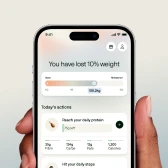Whether it’s our cab pulling up in sub three minutes or those clothes we ordered arriving the next working day—in the modern world, we all like fast results. The thing is, sustainable weight loss is rarely a quick fix. So try not to be disheartened if that number on the scale doesn’t nosedive right away. Because actually, if you’re doing things right, it shouldn’t.
So, how much weight can you lose in a month? What’s a healthy goal? And why does setting realistic expectations mean you’re better off in the long run?
Safe rates of weight loss
According to the NHS, 0.5-1 kilograms (1-2 pounds) a week, or 2-4 kilograms (4-8 pounds) a month, is the sweet spot for safe and sustainable weight loss.
There are plenty of fad diets that promise to help you shift weight faster than this (like avoiding entire food groups, or consuming very few calories per day). But hacks like this are hard to stick to, and don’t set you up with the lifestyle changes necessary to keep weight off. So while you might see the pounds drop initially, they’re likely to come back before long.
Plus, fad diets can come with health risks, like nutritional deficiencies, muscle mass loss (instead of fat loss), and low energy—so it’s a lose-lose.
Factors influencing weight loss
Everyone’s different. How easy it is to lose weight over a month, or any other duration, can vary from one person to the next. So let’s take a look at some of the factors that can be involved.
Your lifestyle
No surprises here: diet and activity levels (but especially diet) play a big part in weight loss. Generally, we need to be in a calorie deficit to lose weight, which means we need to be burning more calories than we’re taking in.
That’s why easier and effective weight loss will always go hand in hand with a considered, balanced diet and regular exercise. And the more you consume food and drinks high in calories, sugar, and fat (e.g. fried food, ultra-processed food, alcohol, fizzy drinks), the harder it’s likely to be.
(Too much of a calorie deficit can decrease your basal metabolic rate (the energy we use to just stay alive), which means you will be burning less energy throughout the day. In addition, it can lead to loss of muscle mass. If the calorie deficit comes from the exclusion of some food groups, it can also lead to nutritional deficiencies. So, as with everything in life, it’s about balance.)
Besides diet and exercise, research also shows that not getting enough sleep can make it harder to lose weight, since sleep deprivation affects the hormones that control our appetite.
Ditto if you’re dealing with a lot of stress in your life: the stress hormone cortisol can promote a buildup of fat around our middles, and bring on sugar cravings. We’ve covered this in more detail in a separate article about stress and weight loss.
Your health and medical history
Sometimes, certain health conditions can make it harder to lose weight. These include:
- An underactive thyroid gland (hypothyroidism) where your thyroid gland doesn’t produce enough hormones
- Cushing's syndrome, a rare disorder that causes the overproduction of cortisol
- Polycystic ovary syndrome (PCOS), a hormonal imbalance that leads to irregular ovulation
Certain medications can also affect our ability to lose weight easily. These include some steroids, alongside medications for epilepsy, diabetes, and mental illnesses/disorders like depression, anxiety, and schizophrenia.
Your gender
Some scientific research into weight loss programmes shows men losing more than women. It’s thought that a women’s genetic makeup can make it slightly harder for them to lose weight (they typically have more body fat and less muscle than men, which affects metabolism).
But there’s also studies where men and women lost comparable amounts of weight—and others where women got better results. Because there are so many factors at play besides gender (like all the ones we’re discussing here). So it’s far from a hard-and-fast rule.
Read more about weight loss for men vs. women.
Your age
Weight loss can become a little harder for everyone as they get older. Studies have shown that fat mass increases and muscle mass decreases with age, which slows down our metabolic rate.
Age-related hormone shifts are part of it. Many people move less as they get older, too, which can exacerbate barriers to weight loss.
Learn more about factors that might be making it harder for you to lose weight.
Muscle mass
One factor that many people don’t realise affects weight loss is muscle mass. The more muscle you have, the higher your basal metabolic rate. Because muscle burns more calorites than fat, having more muscle helps you lose weight and keep it off.
Setting realistic goals
To be super clear, if any of the above factors do affect you, don’t be disheartened! There are weight loss methods that can work for everyone. It’s just about exploring the right path for you—which is why it may be helpful to talk to your healthcare provider about a personalised weight-loss plan.
The key is to set weight loss goals that are realistic for you. And in order to meet them, remember: Sustainable lifestyle changes are your friend. But quick-fix fads—however tempting they may be—aren’t.
Need some motivation for staying committed? We’ve got you covered.
How medications can assist with weight loss
Losing weight can feel really tough sometimes. And when we’re trying our darndest, and not seeing results, it’s easy to want to give up.
That’s when breakthrough weight-loss medications like Mounjaro or Wegovy can be a good option if a healthcare provider says they’re suitable for you. They work by mimicking a hormone called GLP-1, which makes you feel fuller for longer and reduce appetite and cravings, so you eat less.
These medications are not a quick fix. You’ll still need to address all the same lifestyle factors on your weight loss journey. But when taken alongside changes to your diet and regular exercise, some people report losing up to 25% of their starting weight.
Stephen, for example, lost 35kg—read his success story.
How much weight can I lose on Mounjaro in a month?
So, on average, people on Mounjaro lose around 4% of their body weight by month one, 6% by month two, 9% by month three, and 11% by month four (with results reaching up to 22.5% at the 72-weeks mark).
But everyone’s journey is unique—as we’ve covered, factors like starting weight, lifestyle, and individual response can all play a role.
And crucially, we repeat: effective and lasting results depend on pairing Mounjaro with a healthy diet and regular exercise. That’s why we’ll arm you with a dedicated Mounjaro diet plan to follow alongside it.
How much weight can I lose on Wegovy in a month?
On average, on Wegovy, people lose just over 2% body weight by month one, 4% by month two, and 6% by month three—with results ultimately reaching up to 15% for some people.
And in the STEP UP trial, which looked at participants taking a higher 7.2mg dose of Wegovy, the average loss was 20.7% over 72 weeks. This means the gap in effectiveness between the Wegovy and Mounjaro is narrower than ever.
You already know what we’re going to say. Pairing Wegovy with sustainable lifestyle changes is critical for lasting results. So we’ll make sure to set you up with a Wegovy diet plan to boot.
Safe, sustainable weight loss
So there we have it. A realistic amount of weight to lose over a single month is between 4-8 pounds.
And whatever your ultimate goal weight is, you want to work towards it gradually over time, via sustainable lifestyle changes, rather than looking for some magic quick-fix. This will also help you minimize loose skin compared to rapid drops.
Remember, healthy and effective weight loss is a marathon. Not a sprint. You’ve got this!
If you’ve been trying to lose weight, but you’re not seeing results, weight management medication can be a great option if a clinician recommends it’s suitable for you. Through Voy’s weight loss programme, you’ll get effective medication, personalised support from our team of coaches, and an app to help you keep tabs on your progress.
Find out if you’re eligible right now by filling out this form. It takes less than five minutes.












